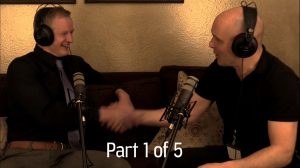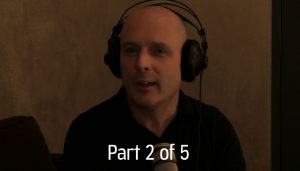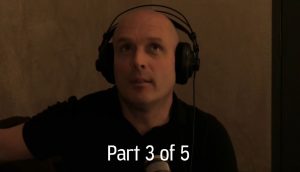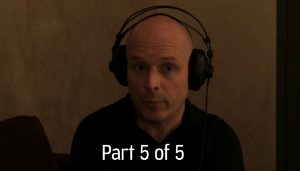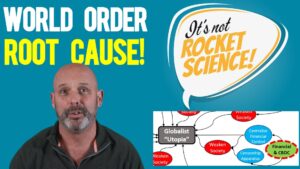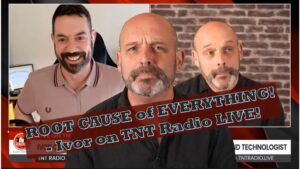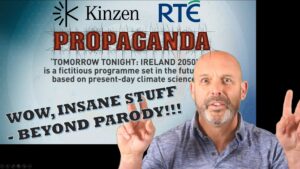Episode 55: Short and punchy conversation today with the super-smart Christian Assad MD. He’s a hard-hitting Cardiologist who gets to the core of the matter. And he doesn’t take any prisoners when debating on Twitter – rightly so! ( @ChristianAssad – https://twitter.com/ChristianAssad ) Hopefully you’ll enjoy this conversation as much as I did – and be informed on how to greatly lower your risk of disease…
FULL TRANSCRIPT:
Ivor Cummins 00:00 Hey guys, we’re here at Low Carb Houston and who do I meet? Only Dr. Christian Assad. Great to see you, Christian.
Christian Assad 00:06 Likewise. Pleasure.
Ivor Cummins 00:08 We have met before physically, have we?
Christian Assad 00:10 No, I don’t think so. Just Twitter.
Ivor Cummins 00:12 Yeah, Twitter. Now Christian is quite aggressive and outgoing on Twitter to call things as they are and you’re cardiologist of preventative interventional?
Christian Assad 00:23 Interventional Cardiologist, but with tremendous interest in prevention. No doubt.
Ivor Cummins 00:28 Of course. Yeah. And I thought we talked through just a few of the big issues in cardiology and heart disease in general, no particular order, but just given your extensive experience and your insights, you know, in your journey, a lot of the things you learned early on in cardiology, you’ve changed your mind on a lot of the big issues, you form new opinions on so maybe we just run them through some of those.
Christian Assad 00:50 Definitely. I think one of the biggest things that have impacted in my life is when I arrived to McAllen, which is where I work, it’s the most obesity in the United States. And basically, what I notice is that metabolic syndrome is strongly prevalent in the population. And then as we start looking into the data, as most of your audience will know, insulin resistance plays a very important role in this matters. So I started getting this feeling when… I’m getting people in their 30s, 34, having STEMIs, heart attacks, blocked arteries, 38 with heart failure. Of course, they’re on the medications. Is it making a significant impact? No! I mean, bottom line is no, we need to change and focus what is it that got them to be as sick as they are in this point. And one of the big controversies which I will not get into those details, but it’s LDL and statin therapy. And I think that when we we prescribe statins as a physician, we are to a certain extent, falsely reassured that the patient is going to be okay. That’s not the case. I mean, my patients with statins continue having their issues. And LDL will play an important role in cardiovascular disease, in atherogenic plaque, but we also need to… we cannot ignore everything else that is going around. We cannot ignore the hypoglycemia. We cannot ignore the different aspects of hyperinsulinemia, basically making it pro inflammatory. High insulin can make you adipocytes, produce more inflammatory cytokines, RBP4, an inflammatory cytokines which is then going to go to your leukocytes to produce more interleukin 6, interleukin 1, TNF alpha.
02:42 So we start seeing a lot of inflammation going on, hyperglycemia is screwing up your glycocalyx, which is basically exposing your endothelium, insulin alone when it’s hyperinsulinemia, the anti and the apoptotic effect which for your audience is cell bath basically. So insulin on normal levels has a protective effect against apoptosis. When we have hyperinsulinemia, we lose that. So now we start putting a lot of things. We’re talking about endothelial, we’re talking about insulinemia and how insulin is promoting smooth muscle cell growth. So, therefore, a vessel that is less compliant.
03:21 We are stimulating endothelin-1 production, so more vasoconstrictions, high blood pressure, nitric oxide is not being produced adequately, therefore we are decreasing vasodilation. We are increasing pressure. Glycocalyx, inflammation, ___6 [Inaudible 00:03:38] So we start seeing a lot of players in this setting. And just saying LDL alone is going to be… I mean, let’s start it as well all the other issues and by decreasing insulin, we will be correcting hyperglycemia. By decreasing insulin we’re going to be stimulating less absorption of water and sodium in the kidneys, decreasing blood pressure which is playing a very important role in atherogenic plaque and hypertension.
04:09 It’s not ignoring everything else. We feel falsely reassured that, “Hey statin, you’re going to be fine.” But I’m not telling people not to focus and ignore completely the LDL, but we need to pay equal attention, if not more, to everything else that is happening. I guess that answers the question.
Ivor Cummins 04:34 There’s a lot to unpack there, Christian. But you’re [right], absolutely every bit of it resonates. So yeah, you’ve got your glycocalyx, which is the kind of polysaccharide protective layer on the inside of your artery wall, then the endothelium, single cell there. And that’s your whole protective structure to prevent atherosclerosis. But as you’ve just described, those myriad inflammatory markers, myriad damages and deleterious effects that occur that open up your arteries to damage independent of the LDL vector. And of course hyperinsulinemia, hyperglycemia, and inflammatory drivers autoimmune as well, they all act and they’re probably the biggest pareto or the biggest part of the problem and the LDL being drawn in as a part of the problem, but it may actually be the lesser pareto or the more secondary effect. We’re not hating the big drivers.
Christian Assad 05:25 Well, here’s a question that I’ve asked multiple colleagues of mine, interventional cardiologists, and I asked them, “When was the last time that you treated a heart attack and I’m somebody whose only risk factor was having high LDL?” Crickets.
Ivor Cummins 05:41 Yeah.
Christian Assad 05:42 I mean, bottom line… we can avoid the familial hypercholesterolemia, which I mean, they’re even zeros. I mean, it’s not something that we see very often. But the fact is, if LDL alone is such a bad thing, well, why aren’t we seeing patients with that being their only issue? No, it always comes with a myriad of problems. So, once again, I mean…
Ivor Cummins 06:10 And even Christian, if you tie it back to as you say hyperinsulinemia being a big player, not the only player, it’s a big player. But we pretty much know now that especially in younger man, where LDL is a better predictor of future events, high LDL in younger man. It’s not so good to predict to older or women, but in younger man, hyperinsulinemia and metabolic syndrome can actually drive cholesterol synthesis and drive up the LDL. So the LDL is a sign of deeper problems rather than the problem.
Christian Assad 06:43 Yeah. When we start doing just PubMed research on hyperinsulinemia, there’s very interesting data out there. I mean, there’s even a publication saying hyperinsulinemia, related to cardiovascular events. I mean, simple as that. I mean, you have high insulin, you have increased cardiovascular events.
07:02 There’s a very interesting study from 1961, in which they were injecting insulin to dogs in one leg for a couple of weeks. And then the other leg was only getting normal saline. The leg that I was actually getting the insulin, therefore a state of hyperinsulinemia, atherosclerotic plaque, fatty acid disposition. I mean, cholesterol deposition. And the other leg, nothing. Now of course, you cannot do that in a human but I mean, it shows you something pretty strong about it. That is from 1961. Where is this research? Why aren’t we paying more attention to it?
Ivor Cummins 07:42 Well, perhaps you could put your money where your mouth is Christian though, and you go ahead and do that experiment on yourself.
Christian Assad 07:47 Yeah, I’ll pass. But thank you,
Ivor Cummins 07:50 But yeah, though that is the 60s. And there’s these amazing papers over the last 50 years that prove the point,. But you’re right, they’re kind of ignored because there’s no way of tackling with a drug or a good pharmaceutical or a good solution, and therefore no one really is interested so much.
08:08 An interesting one I put in my talk yesterday actually was a recent one, [Inaudible 00:08:12] Mander sent me from Iceland, a doctor over there, a pal of mine, and I hadn’t seen this one before. 2004, incredible. The high LDL people up 160, over 160, average of 180, 190 milligrams, huge LDL, but they are the exact same mortality curve and cardiovascular mortality as the low LDL guys. There was no effect with super high LDL. However, when they had super high LDL but they had high transferrin saturation or iron metabolism issues, then the high LDL people did have a much worse outcome. And it was proposed that iron oxidizing LDL particles and metabolic syndrome, driving iron metabolism, but we also have that data ferritin and of course, for insulin resistance. All of these real causes when you combine them with higher LDL, maybe worse outcomes. But what’s driving the bus? It’s behind LDL. It’s all of these metabolic derangements.
Christian Assad 09:16 It’s ferritin, I mean, again, it could be a marker for inflammation.
Ivor Cummins 09:19 Yeah, it is. Yeah.
Christian Assad 09:20 I mean, once again, it does, everything starts pointing towards that there has to be a disruption in the endothelium, and if you follow that up with inflammation, then you’re having apoptosis. I mean, there’s multiple things that play or that we can… I mean, it’s surrogates, I understand, but everything is playing a role in plaque. I mean, from inflammation, from apoptosis, from smooth muscle cells being thickened, and then the cells start spreading therefore permitting more inflammation, and, well LDL resilience basically facilitates the passage for the nightmare that we see.
Ivor Cummins 10:09 Yeah, exactly. One thing I learned relatively recently ties directly into what you say that the LDL doesn’t willy nilly just come through between the endothelial cells. It’s transcytosis, it’s brought into the endothelial cell, engulfed in a vacuole, brought across with signaling to the other side of the endothelium and popped out into the wall. Now, that’s an evolution designed, highly complex process evolved. And yes, transcytosis goes up when you have all these other problems. So you could say we would make sense, much more sense, that all of these metabolic problems you describe and the smooth muscle cells inflammatory, they actually drive and signal to bring in LDL. So now where is LDL as a dangerous, toxic molecule? The system is actually drawing in LDL as a response to injury, which is quite fascinating. You could look at the LDL as more responding factor than a factor that’s hammering your arteries.
Christian Assad 11:09 It could be. Yeah, Dr. Ali spoke about that yesterday. I mean, my knowledge to that hypothesis, I mean is limited. It’s what I learned yesterday. Is it possible? Yes. I mean, I think anything is possible. Meaning, my way of recommending things is very different. The knowledge that I have from what I graduated with is the things that I’ve… going back to the research, me reading the publications and then making up some conclusions from the data. And I think the whole medical community is finding some alarming things in discrepancies between what we were taught and what works. For example, if somebody came to my clinic two years ago and told me that they want to do a ketogenic, low carb diet because they wanted to reverse all this thing, I would say, “You know what, you’re crazy. It’s not going to work.” I mean, “Shoo!” And that is completely the opposite of what I do now. I mean, as an interventional cardiologist, I am we getting referrals for 24-year old-patients for lifestyle modifications. So like…
Ivor Cummins 12:14 Some difference.
Christian Assad 12:15 A 100%. The reason why you say is we, we need to rethink the things and when we start digesting all the information and apply to the reason why we do things, I would ask my colleagues, “When was the last time that you were able to reverse disease with medications?” My patients came over and over with a lunch box, 20, 25 medications, nobody says anything. Nobody says, “Well, my doctor just included me with this medication. They did this, they did that.” But somebody says no carb keto or fasting and the medical community goes crazy or other people just…
Ivor Cummins 13:00 It is a bizarre double standard, yeah, that you’ve got something with so much positive evidence growing for decades ago, but also growing every year now, but it’s kind of shunned because it’s not a proper intervention. It’s not medicine; it’s a funny diet. But in terms of reversal, you just mentioned reversal, and that’s becoming quite topical, reversal of heart disease. Now, Dr. Faisal on the first day of the Low Carb Houston Conference spoke on coronary calcium scanning and I know you’re a big proponent. So we’re seeing now a lot of evidence of reversal of soft plaque and perhaps even hard calcification. So what do you think of a) the coronary calcium scan to clarify who is really diseased and not and get away from the proxies, and b) the idea of working towards reversal with diet and lifestyle?
Christian Assad 13:53 Some people have access to a calcium score very easily and they requested… I mean sometimes if we go by guidelines of things, we need to give the patients reassurance. So depending on risk factors, family risk factors, is there early history of coronary disease, of heart attacks in the family? I mean, somebody that has a fat father in 40s, having a heart attack, that is definitely somebody that in my book is going to get a calcium score. I mean, I want to know, even though you tell me you’re healthy, I want to see what’s going on in addition to a sets of labs. It’s hundred bucks.
14:29 I do have some people here coming to me and they’re saying that they cannot order it or that the physician having some issues. It’s not something that I’ve encountered, but there’s other scenarios in which, for example, people that are in a statin therapy and they want to stop statin therapy. We need to get the research and make a decision as a team. So if the guy wants to stop completely a statin, I mean, if we go by the research and publications, I mean, if you’re below 100, or you’re in zero, then I mean, I feel far more if you’re metabolically healthy, to… I mean, I feel more strongly about, “Okay, if you don’t want to take the statin, it’s okay.” But if it’s somebody that has a calcium score of 400 and is metabolic broken, and already had a cardiovascular event, I mean, I’m not a standard denier. I’m not a proponent. I mean, I’m in the middle. And what I do is I have a discussion with my patients, and sometimes they want to decrease their LDL in different manners, red yeast. I mean, I have had patients that they go for a more pescatarian keto, with more wild caught salmon and red yeast and I have decreased their LDL from 200 to 103 months.
15:46 I’m open to the possibilities and I think the key is speaking with the patients, talking about risk versus benefits, and then making a decision as a team. It’s not, “You take it because I say so.” No, that doesn’t fly. I mean, we need to have that conversation.
Ivor Cummins 16:00 Yeah, and I think that’s a great point, Christian. In the UK, the doctors I know, Aseem Malhotra, the cardiologist, it’s a shared decision making. So you present the evidence from the trials, the amount of risk reduction you can expect, the number, who got risk reduction out of the number treated, and basically give the information to the patient and that engages the patient and probably makes them more willing to follow the excellent lifestyle advice that you’re giving them because it’s a package. So yeah, I really like that concept. And the calcium score of course we know for middle risk people, maybe with a family history, maybe not, the middle riskers who are the majority from the algorithm, 60 to 70% of those guys can go into higher low just when they do a scan and they get the results. For an engineer, it’s so attractive. We find the really dangerous guys, we find the safe guys and they can relax.
Christian Assad 16:54 Exactly.
Ivor Cummins 16:55 It’s stratified beautifully. I think with the new 2018 guidelines last year, though a huge movement to 2a evidence level rating, we’re going to see, and those papers you mentioned that below 100 calcium score, statin appears to give no real benefit in 10 years above 100, substantial benefits, II think we’re going to see a lot more use of it.
Christian Assad 17:16 And it’s focusing, I mean, if we want to reduce and we’re focusing, okay, “I wanted to reduce your LDL. My goal is to reduce your chances of having a cardiovascular event, then we cannot ignore that, well, just like I want to reduce your LDL, I want to reduce your triglycerides. I want to reduce your insulin. I want to reduce your hypoglycemia. I want to remove your blood pressure. I want to make you more active. I want to reduce inflammation.” I mean, there’s so many factors, and medication is not going to to do that; lifestyle will.
17:47 There’s tons of research regarding even the use of sauna, meditation, adequate sleep is key and insulin resistance and many of us, we are stressed, we don’t sleep well. And then what we get? We get Ambien. We get a medication to sleep supposedly, but that is not helping us with our deep sleep or anything like that. We get medications to try and fix something that is affecting us but we’re just getting poor sleep. I mean, we’re not really getting the restorative sleep that we would want, like in that aspect by taking something like Ambien. And you start getting cravings for the crap food that we should not be eating.
18:27 Once you start looking at it and you just get a bird’s eye view, we can see that there’s many different interventions by lifestyle that can impact the five variables of metabolic syndrome. And we can go with fasting, low carb keto, we can go with adequate sleep or episodic of high intensity interval training or different exercises, sauna, sleep, and meditation. All of them tremendous research
Ivor Cummins 18:55 And probably synergistic too.
Christian Assad 18:57 Exactly!
Ivor Cummins 18:57 So more than the sum of their parts. So the patients really need to understand, you don’t really pick from a menu, you’ve kind of got to apply all the menu items together. That’s where the big bang for the book. And I know Dr. William Davis, a cardiologist, had him on the podcast, and he feels so strongly on synergy that if you just get someone to improve their sleep, or just go lower on carb, you’re not going to see a major result in a trial. His trial in 2009, where he showed half the people reverse their calcification, the other half, most of them slow the progression and he gets no repeat heart attacks with these types of people. He did fish oil, vitamin D, there was sleep counseling, he did a mild statin, and he did magnesium. So he put together a lot of key supplements into a synergistic kind of bullet. And it worked. Myself and Dr. Garber, we have the four S’s reminds me, it’s Sun, Sleep, Stress and Supplements. Just to remember the non low carb, non exercise things, those four. Sauna, we didn’t have in but I’m hearing more and more about the benefits.
Christian Assad 20:03 You go, [Inaudible 00:20:04] you’re going to find research from 23 years ago. And literally it targets everything from insulin resistance, to blood pressure to inflammation. I mean, the research is there from the Japanese and there were research from Finland. And it’s pretty hard to ignore. I mean, it’s pretty dramatic changes and the physiology is there.
Ivor Cummins 20:21 And just for clarity, these are essentially randomized control trials. These are trials rather than mechanistic studies suggesting benefits.
Christian Assad 20:30 Some of them are. Yeah. But we get what we have. At the end of the road, I mean, even for heart failure patients, it… I mean, there’s trials of sauna in improvement on heart failure patients. I mean, who on earth prescribes that? Nobody. But we are always very easy in prescribing. So we need to consider something that is not coming in a pill. Something that can actually make you feel pretty good when you go there. I mean, this is not medical advice, but the point is that, if you’re going to try it, you try different temperatures, maybe five minutes, see how you feel and start taking it from there. Me personally, what I do is I do 20 minutes in the sauna from 160 to 180 degrees fahrenheit, but I meditate at the same time. So it’s two birds one stone.
21:15 Now In addition, if you do sauna, there’s even studies out there showing how you get a significant increase in growth hormone production.
Ivor Cummins 21:24 Ohh. Good!
Christian Assad 21:24 So hey, you went to the gym, you finished your workout with a sauna and meditation. I mean, do I have research? No, but there’s publications. Is it going to harm me? No. And I feel amazing. Getting this type of data, and we can apply to patients and it’s all healthy lifestyle,
Ivor Cummins 21:46 And gym membership generally around the world has fallen in price. There’s a lot of availability, so it’s not too hard to access. You don’t have to be a wealthy person to access these things. You don’t need to be a wealthy person to eat low carb keto. I mean organ meats cost almost nothing.
Christian Assad 22:01 $3 for a liver, yeah.
Ivor Cummins 22:02 Yeah, yeah. And then the high fat mints, which is arguably much healthier than the very lean stuff for many people, that can be a non premium, quite cheap product per kilogram or pounds. So, I think a clever low carb.
22:16 Another thing I love is that eggs are relatively price low, even free range, because of the scare of cholesterol. Eggs are not really a premium product and they are nutrient bombs. So all these great things.
Christian Assad 22:28 There’s a funny article, I don’t know if you saw a New England Journal of Medicine, the guy that actually was eating 25 eggs per day for 20 years?
Ivor Cummins 22:36 Yeah.
Christian Assad 22:36 Cholesterol, nothing. In medicine, it’s the hokey pokey. You put your left foot in, left foot out. I mean it’s like coffee is good for you. Coffee is bad for you. “Coffee is good for you, coffee is bad for you.” And we go with that with eggs. Eggs are good, eggs are bad. Eggs are good, eggs are bad.” I mean, “Make up my mind.”
Ivor Cummins 22:52 Everyone is utterly confused. It is true. And now we’ve got low carb keto was good. We’ve even got a carnivore movement. But on the other side vegans are saying that the meat will kill you and vegan is the best thing. So the man or woman in the street, it does absolute snowstorm and our academics and doctors at the top level like you say, coffee is good, coffee is bad. New study. It’s madness. People I think need to do their own research carefully and find people who they trust who can do it on their behalf
Christian Assad 23:23 For me the right for somebody telling somebody how to eat ends when the right for that individual starts to decide on what he eats. “Shut the hell up! It pisses me off!” So, the point here is if I try, with something with Mexican culture, McAllen, McAllen is practically Mexico. If I tried to convince somebody of those guys to eat vegan, in a V or vegetarian way, you think I’m gonna have luck? No, impossible! It will not happen. Not with that culture. So now, I’m open to any way of eating. You want to be a pecatarian, you want to be vegan, you want to do whatever you want. I mean, there are very healthy ways to apply it to your life and improve.
Ivor Cummins 24:08 Yeah.
Christian Assad 24:09 And we focus on or I focus on, “What is the most likely way that I’m going to get you to follow a proper lifestyle, not for a couple of weeks, but for the rest of your life?” Now, if you tell me, “I’ve had patients, one that he’s like, you know what? I don’t want to eat meat.” “Fantastic! I’m with you, and let’s formulate a vegan vegetarian diet.” And fine, I have no problem. But trying to convince somebody that as a Mexican culture, not eating meat, good luck with that one. Carne asada and leaving that behind, that’s not going to happen.
Ivor Assad 24:44 Very good point. Absolutely. It is in the individual. And as you say, if they have personal ideologies about animals, there’s a way to construct a keto type vegan diet. And of course supplements are important for nutrients you may be low on, but it can be constructed. And you know vegetarian diets in terms of attacking heart disease, [Inaudible 00:25:05] Ornish and these guys, there is some truth in that. If people switch from a standard American diet to a relatively low calorie starvy diet with very low fat, you can actually achieve insulin sensitivity. So it’s not what I choose ever, but it can be made to work once people are well informed and clever about it, or they have a great doctor like yourself advice them. Isn’t that right?
Christian Assad 25:29 Well, if you say so. Thank you.
Ivor Cummins 25:31 Excellent. Listen, I know you got to go back to your panel, Christian. So, great to meet you finally.
Christian Assad 25:36 Likewise. It’s always a pleasure.
Ivor Cummins 25:38 Lovely. Cheers!
Christian Assad 25:39 Already.
Ivor Cummins 25:39 Just want a quick last thing. We’re always looking for people to help, share ihda.ie, the website and down the bottom of the homepage you’ve got share buttons, and also sign up to the Fatemperor.com. Subscribe, because we are finding it’s very hard to get the right information out there. And increasingly I think search engines and others are optimized for more orthodox medical advice perhaps, so great if you can help get the message out. Thank you.

